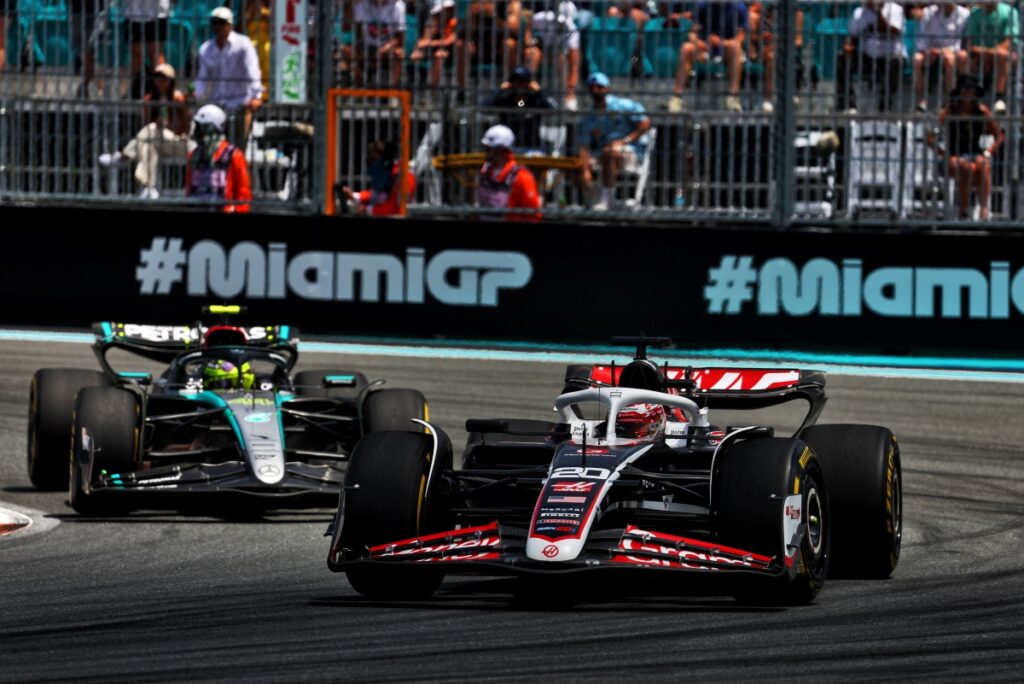Is Formula 1's Penalty System Broken? Drivers Speak Out on Controversial Rules

The buzzing conversations in the Formula 1 paddock as the Grand Prix circus arrived at the historic Imola circuit revolved around penalty points. Kevin Magnussen has almost found himself facing a race ban after the Miami Grand Prix, bringing the issue of penalty points to the forefront. His defensive driving tactics earned him three penalty points during the Miami Sprint and an additional two for causing a collision with Logan Sargeant during the Grand Prix.
Beginning the year with zero points, Magnussen now has 10 points, merely two away from the 12-point threshold required for a race ban. His slate won’t be wiped clean until next March, which means he's treading on thin ice for the foreseeable future. Unsurprisingly, journalists swarmed for the drivers' opinions on penalties during the media sessions ahead of the Emilia Romagna Grand Prix.
Yuki Tsunoda, who has been at the receiving end of Magnussen’s aggressive tactics in both Jeddah and Miami, advocates for an extension of the penalty point limit in line with the increasing race calendar.
“It would be nice to extend the points,” said Tsunoda. “They haven’t changed for the past decade when there were 18 races, and now it’s 24 races. They increased the races but didn’t increase the points, so if we have more races, they should extend the points to allow more flexibility. Nevertheless, repeat offenders should be penalized more harshly to ensure fair play.”
Magnussen also believes that there is a need to revisit both the maximum limit of penalty points and the infraction thresholds.
 Haas VF-24. 04.05.2024. Formula 1 World Championship, Rd 6, Miami Grand Prix, Miami, Florida, USA, Sprint and Qualifying Day." />
Haas VF-24. 04.05.2024. Formula 1 World Championship, Rd 6, Miami Grand Prix, Miami, Florida, USA, Sprint and Qualifying Day." />Previously, drivers were instructed to give back positions if they gained an unfair advantage. However, the race stewards have distanced themselves from this responsibility, making the situation more chaotic. Haas has managed to exploit this loophole on two occasions, accruing time penalties and penalty points for Magnussen while gaining an advantage.
Magnussen is confident that if drivers were instructed to give back positions, he wouldn’t be facing a race ban.
“The best solution would be for the FIA to instruct us to give back positions,” he suggested. “The consequence of not complying should be severe, ensuring compliance. This approach would simplify the rules and reduce the risk of severe consequences for minor infractions.”
Magnussen is not alone in his criticism. Fernando Alonso has also voiced his frustration with the race stewards throughout the 2024 season. After experiencing inconsistent penalties in Melbourne and Shanghai, Alonso reached his boiling point in Miami when Lewis Hamilton went unpunished for a Lap 1 Turn 1 incident in the Sprint.
 Aston Martin F1 Team with Mohammed Bin Sulayem (UAE) FIA President on the grid. 21.04.2024. Formula 1 World Championship, Rd 5, Chinese Grand Prix, Shanghai, China, Race Day." />
Aston Martin F1 Team with Mohammed Bin Sulayem (UAE) FIA President on the grid. 21.04.2024. Formula 1 World Championship, Rd 5, Chinese Grand Prix, Shanghai, China, Race Day." />“I think penalties have been inconsistent,” Alonso remarked. “When there’s an accident or investigation, the parties involved always have differing viewpoints, which is natural. However, over the past few years, we’ve seen situations where both parties agree on the facts, but the referee’s decision is out of sync. This is something that needs work.”
Carlos Sainz shares this sentiment. Feeling “puzzled” after two separate incidents in Miami, Sainz struggled to understand the stewards’ decisions. A reckless move by Sergio Perez that almost caused a massive collision went unpunished, while Sainz received a five-second penalty for a low-speed clash with Oscar Piastri.
“I think we’re still looking at the outcome of penalties,” Sainz said. “If Piastri's front wing hadn’t been damaged, I probably wouldn’t have been penalized. This inconsistency needs addressing.
Ultimately, the issue boils down to communication and consistency. Regulations should revert to instructing drivers to give back positions for unfair advantages. This approach is straightforward and easily understandable.
Furthermore, the role of race stewards should be given to permanent, professional officials, rather than rotating volunteers. This would provide consistency in decision-making and reduce confusion and frustration among drivers and teams.